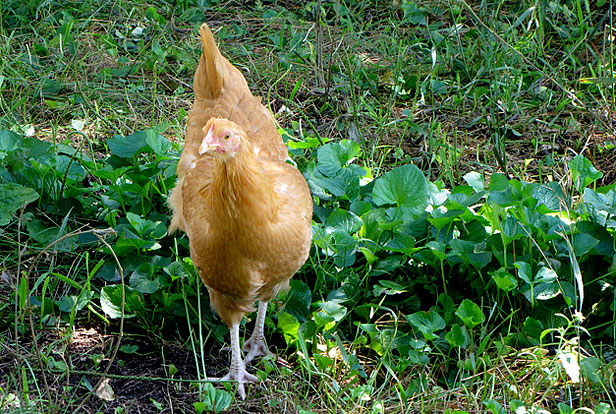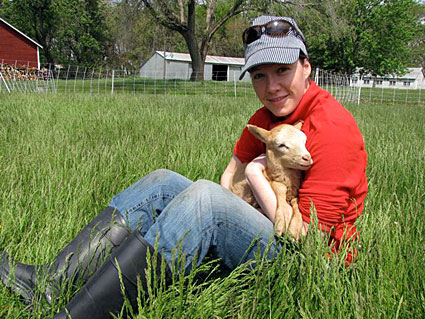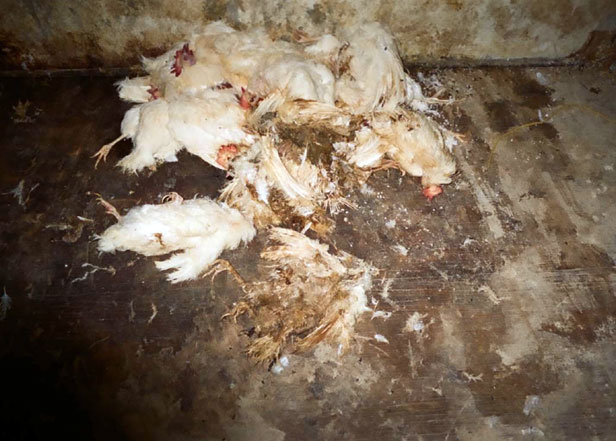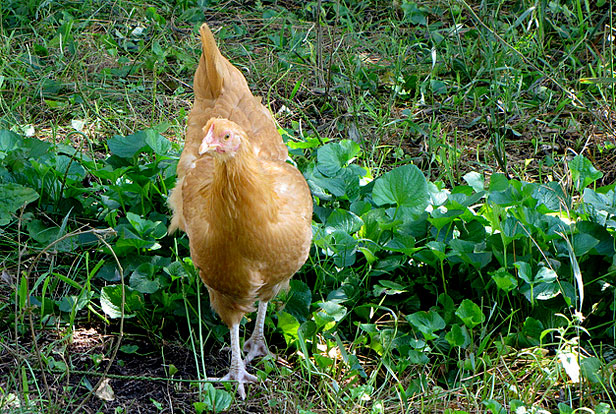 My Buff Orpington in happier, healthier days.Photos: Steph Larsen
My Buff Orpington in happier, healthier days.Photos: Steph Larsen
With a few exceptions, the animals on my farm are not pets. My sheep and chickens have jobs to do — eating grass and bugs, making eggs and meat and babies. If they don’t do their job, they don’t stay on my farm.
That isn’t to say that I don’t treat them well or care what happens to them. In stark contrast to the images we see of factory farms like Jack DeCoster’s, where dead animals rot on the floor (not to mention are routinely deprived of body parts including beak tips, tails, and teeth), I’d like to think I’m pretty quick to notice if one of them isn’t feeling well and take steps to alleviate the problem. But while I do my best to take care of it, I don’t treat sick livestock in the same way I would treat Arrow the dog or Clementine the housecat if they were sick. I’m not above giving medicine if it’s not expensive, but taking a chicken to a vet for surgery?
Recently we noticed that one of the chickens had something funny going on. An over-large bulge on the right side of her chest filled with liquid and swung when she walked. A quick check of the internets led to the diagnosis of “impacted crop,” which is caused by a blockage in the digestive tract. I read that eating long blades of grass can be a culprit, and this particular bird had been confined with another sick bird for a few days, during which time I had fed them long grass. A mistake you can bet I won’t repeat.
Further investigations led me to two possible cures. One was to force-feed her olive oil, massage the crop to try to break up the blockage, then tip her upside down to make her vomit. The other cure was to cut open her crop, extract the blockage, and sew her back up. I called our local vet to see if he had any suggestions, and his response was “Soup.” That didn’t bode well for the bird.
Not being a surgeon and having no desire to cause that much pain to a live bird, I chose the vomiting. And what a stinky, messy job that was. Twice a day for several days she spewed more fluid than I ever thought a bird could hold, and she seemed none too happy about it either. She seems better now, though not out of the woods, so I’m keeping her confined in the chicken “infirmary” until she’s perked up.
 I’d do more to save this lamb than a chicken, but not because he’s cuter. What I did for the chicken isn’t the outer limit for how far I would go to save its life, but I don’t think I’d spend much — and vet trips can get pricey fast. The sheep are a little different in my mind, because we have a lot more invested in each animal. Healthy ewes will produce lambs for six years or more, and their replacement cost is not insubstantial, so I have a greater stake in keeping them well. The ram we’re considering will cost us a few hundred dollars, so I’d probably spend even more than I would on an ewe to keep him well enough to do his job.
I’d do more to save this lamb than a chicken, but not because he’s cuter. What I did for the chicken isn’t the outer limit for how far I would go to save its life, but I don’t think I’d spend much — and vet trips can get pricey fast. The sheep are a little different in my mind, because we have a lot more invested in each animal. Healthy ewes will produce lambs for six years or more, and their replacement cost is not insubstantial, so I have a greater stake in keeping them well. The ram we’re considering will cost us a few hundred dollars, so I’d probably spend even more than I would on an ewe to keep him well enough to do his job.
Once again, it comes down to the fact that a farm is a business. I expect to lose money at the beginning, but raising animals eventually needs to create a profit. If it doesn’t, I should either raise my prices, do a better job of marketing, or get out of the livestock business.
Giving medical attention to an animal that needs it is one of the reason I’ve hesitated about becoming “Certified Organic.” USDA organic rules state that if an animal is given any number of prohibited medicines during its life, it cannot be sold as Certified Organic. Yet these same rules require organic farmers to treat animals that are sick.
I have mixed feelings about this. On one hand, medications like antibiotics are wildly overused in livestock and produce unintended consequences like resistant strains of bacteria. On the other, very young lambs get sick sometimes, and treating them is the right thing to do. Medicine given to a baby lamb is long gone by the time it’s ready for the butcher. It’s unfair to expect a farmer to sacrifice the organic premium for the duration of the animal’s life.
It’s important to keep the standards for organic strong, and you’ll never hear me advocate otherwise. However, there’s definitely a size of farm under which I would feel comfortable with a conscientious organic farmer using nonhuman-classed antibiotics to treat a sick animal, as long as they kept it out of the food stream for an appropriate amount of time. Likewise, there are other farmers who I wouldn’t trust with a sack full of vitamins. But regulators can’t write rules for that.
So for me, I’ll stick to my own rule — I eat meat if I know who raised it, and I trust that their standards are on par with mine. Likewise, I’ll spend hours tending to a sick chicken, but the farm wouldn’t last long if I also spent hundreds of dollars every time an animal eats too long a blade of grass.



